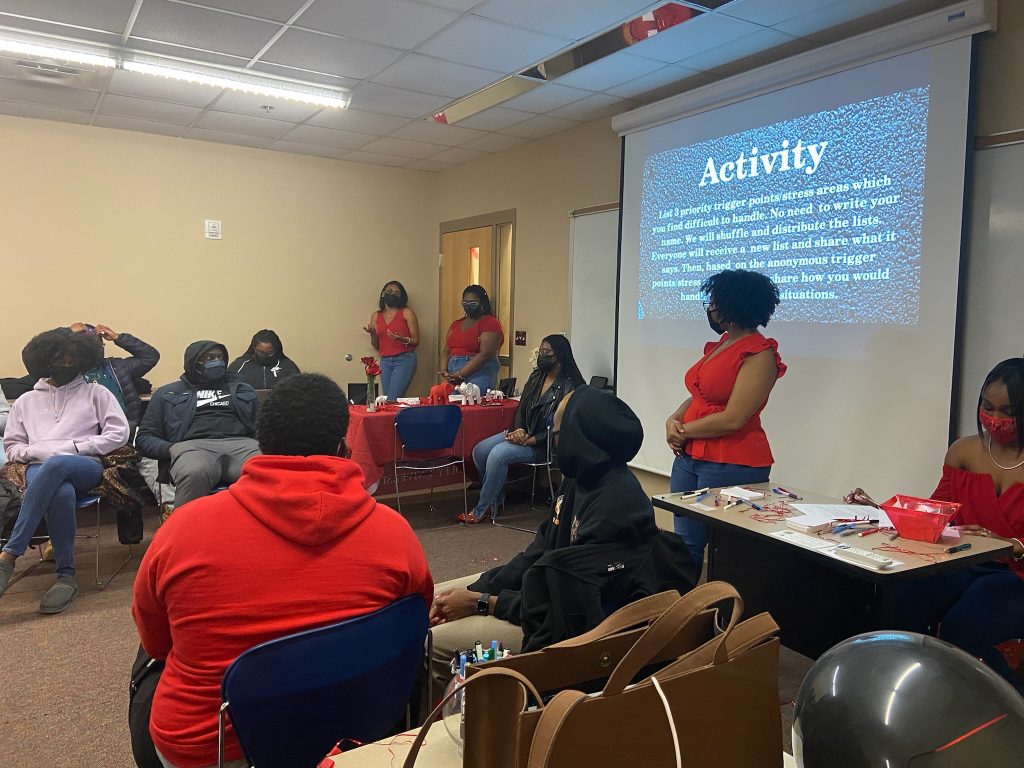
For most people, the word “strong” is a positive adjective used to describe them. For Black women, though, “strong” is a loaded word that can burden them with the misconception that they are constantly resilient and incapable of failure.
The women of the Theta Epsilon chapter of Bradley’s Delta Sigma Theta Sorority, Inc. hosted a discussion about the “strong Black woman” narrative on Feb. 8.
Students gathered in a classroom in Bradley Hall to participate in activities to address mental health issues in the Black community from the stereotypes placed upon Black women.
As described in the event, the “strong Black woman” narrative is centered upon ideas of how Black women should behave, express their emotions and proclaim independence. While acknowledged within the community, these beliefs continue to be harmful and take a toll on Black women’s mental health.
“This narrative has come with so many stereotypes and negative connotations,” Jamiah Glover, senior secondary education and history major, said. “Society expects Black women to be these loud, strong, forceful, aggressive individuals without even knowing the woman they forced the stereotype on.”
For the first 40 minutes of the event, students tackled the subject of the burden of strength. Chapter Vice President Kayla White introduced an activity that required students to move to a designated area of the room after she read a sentence, depending on if they felt the sentence was rarely true, always true or sometimes true.
The four statements were “I don’t give up easily when my heart feels heavy,” “I cry in front of others,” “I can only depend on myself because I know I will get it done right” and “I feel pressure to always be on.”
After the activity, they had a talk about the silent mental health crisis in the Black community. Students mentioned how often times Black people often choose not to seek help due to stigmas surrounding therapy and the expectation to be strong and persevere through tough times.
“[Asking for help] has always been looked down upon, and you were and still are labeled as crazy for struggling with your mental health,” Jada Henderson, freshman sociology and psychology double major, said. “I feel as though if we educate ourselves, our community and family, things will change for the better.”
The final activity had students anonymously write down three trigger points in their lives, and everyone was then able to share methods to cope with the struggles.
Students gave suggestions on how to deal with many aspects of life such as relationships, seeking therapy and managing anxiety.
After the discussion, sorority members mentioned their reasons for hosting the event.
“We felt like we needed to have [this event] on Bradley’s campus because not a lot of people know about this,” Nailah Brown, chapter president and senior political science major, said. “We really wanted to educate the community and help them find some ways to cope.”
Attendees also expressed gratitude for the discussion, its structure and what it meant to them to have had a chance to discuss the issue at hand.
“I feel like this event was very beneficial for Black women and Black men alike,” Kayla Raymond, freshman biomedical science major, said. “It was an open space for us to be unafraid and express ourselves with no judgment. Being surrounded by people that look just like you and hearing that they’re going through the same things you are helps you know that you’re not alone.”

